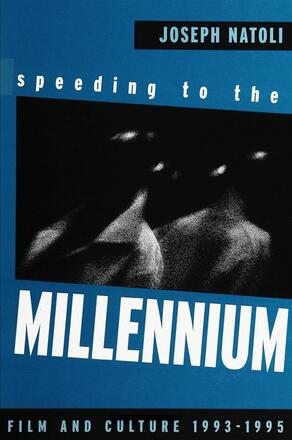
Speeding to the Millennium
Film and Culture 1993-1995
Alternative formats available from:
Intersperses headline events, popular film, postmodern theory, and fictional vignettes in order to capture the elusive cultural imaginary of our twentieth-century fin de siecle.
Description
Natoli offers observations from a postmodern point of view of American culture "speeding" toward the millennium in the years 1993–1995, a time sandwiched between mounting anxieties at the beginning of the nineties and the desperate final journey of the Heaven's Gate cult in the latter half of the decade. Sometimes a whole life, like the Unabomber's, defies our logical grasp. What motivated Susan Smith, the mother who sent her two babies strapped into their car seats to the bottom of a lake? Why did we pay so much attention to the O. J. Simpson trial? Are we crawling toward our own end beyond the horizon of the New Millennium while at the same time thinking we are speeding to new positions in cyberspace? Speeding to the Millennium reviews the headlines and seeks the Big Screen to give some framing to the disturbingly contingent, to the seemingly senseless.
Joseph Natoli teaches postmodernism and cultural studies at the Center for Integrative Studies/Arts and Humanities, Michigan State University, and is editor of the SUNY Press series in Postmodern Culture. He has written Mots D'Ordre: Disorder in Literary Worlds and Hauntings: Popular Film and American Culture 1990–1992, both published by SUNY Press, and A Primer to Postmodernity.
Reviews
"Speeding to the Millennium is a quirky, intelligent, and thought-provoking look at postmodern culture in America through the lens of popular movies and media events of the years 1993–1995. It covers a range of 'texts,' from Forrest Gump to Natural Born Killers to the O. J. Simpson trial, with wit and verve. Natoli doesn't so much 'read' these texts in a conventional manner, as he sees them as allegorical indications of the state of American social life at the close of the twentieth century. His method allows him to make surprising jumps and juxtapositions, as he moves from cinematic details to scary statistics about income distribution to personal ruminations, and back again. I like the book for the unexpected insights that crop up throughout, as well as for the way in which it balances political critique with the claims of pleasure and invention. Overall, Speeding to the Millennium presents a compelling vision of a culture suspended between corporate greed and new technological possibilities, as between the anxieties that lead it to yearn after an impossible return to the past, and the transformations that propel it into an uncertain future. Neither ideological critique nor aesthetic vision, the book partakes of both modes but uses them to create a new form of criticism: what might be called (if this is not too great an oxymoron) a prophetic collage. " — Steven Shaviro, University of Washington
"This book is a feast for the mind. Natoli has a gift for producing illuminating insights, for disclosing the telling ways in which popular culture intersects with the events that produce the headlines in our daily newspapers. I think the book is a must-read for anyone interested in gaining a better understanding of the confusing, increasingly violent, and perplexing times our society and world are undergoing today. " — Karlis Racevskis, Ohio State University